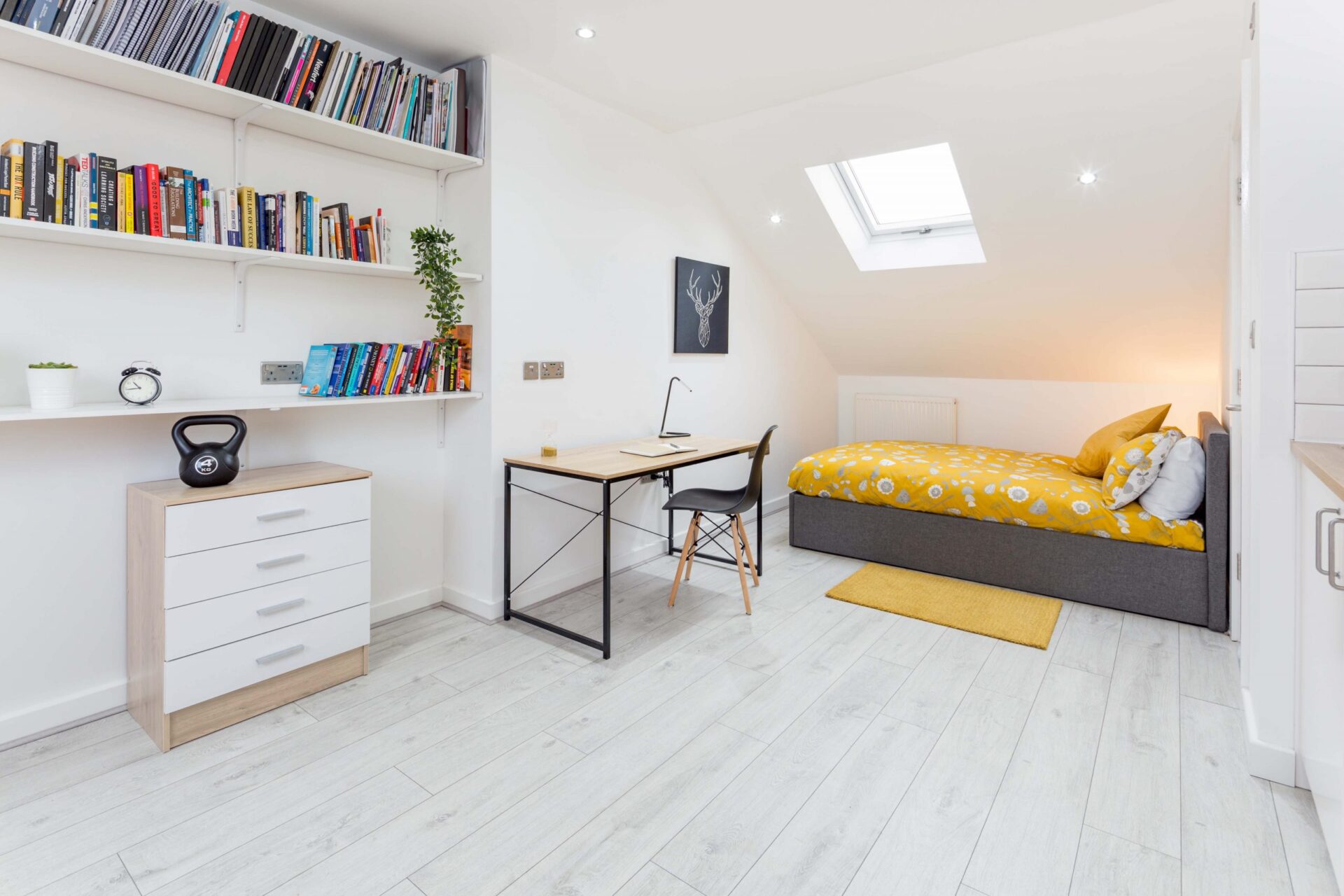
A property rented out to two or more unrelated people who share common areas –the model known as House of Multiple Occupancy or HMO– is a valued investment strategy in the housing market. The pivotal question revolves around the necessity of obtaining an HMO licence. The core concern for ethical property investors is to operate in compliance with the law, safeguard tenant safety and protect their investments. So, let’s explore the ins and outs towards a successful HMO licensing process.
Also referred to as a “house share”, a House of Multiple Occupation (HMO) is a property, or part of a building, rented out by at least three individuals who are not considered a single household, such as a family. In these arrangements, residents share common facilities like bathrooms and kitchens. Under specific conditions, landlords may be required to obtain a licence when renting out a property as an HMO.
The question of whether you need an HMO licence for your properties has likely crossed your mind, regardless of whether you’re new to the field or a seasoned investor. As an ethical investor, you aim to ensure that you’re on the right side of the law while also prioritising the safety of your tenants and safeguarding your investment. The basis of HMO licensing is not just legal necessities; it also grants you peace of mind.
HMO licensing can be straightforward if you’ve followed the necessary steps, including planning and fire regulations. If you’re planning an HMO Conversion or have already completed one – and wondering, do I need an HMO licence so I can rent it out?– this in-depth guide is designed to assist you.
DO I NEED AN HMO LICENCE?
The brief answer to this question depends on the number of occupants in your property and if they are related or not. If there are 3 to 4 unrelated occupants, “selective licensing” applies, which means councils may or may not enforce an HMO licence. However, if you have more than 5 unrelated occupants, “mandatory licensing” takes effect, meaning you definitely need an HMO licence.
Additionally, local authorities have the power to expand licensing for HMOs, covering more areas or whole districts. This helps tackle problems caused by poorly managed HMOs for residents and the public. The introduction of “additional licensing” supports local housing strategies, working together to address homelessness, handle vacant properties, and deal with antisocial behaviour.
Licensing rules and requirements for house shares vary depending on your location in the UK. Distinctions may arise between locations such as Scotland, England, or specific cities like Manchester, Sheffield, and London. These variations can impact factors like timeframes, the renewal process, costs, and associated fines. So, it’s always important to consult with an expert and local council authorities to ensure accurate and up-to-date information for your specific project.
A BRIEF HISTORY OF HMO LICENSING
The concept of HMOs was introduced in the Housing Act of 1985, with more explicit definitions provided in the Housing Act of 2004. Loosely defined, an HMO, or House of Multiple Occupancy, refers to a property rented out to two or more unrelated individuals who share common areas.
In the 2004 act, larger HMOs were also subjected to mandatory licensing. Licensing was originally only mandatory for five occupants or more. But since 2018, it’s now at the council’s discretion to enforce licensing for even 3 or more HMO occupants.

ARE SMALL HMOS EXEMPT FROM LICENSING?
For smaller HMOs with 3 or 4 occupants, the need for an HMO licence is often determined by “selective licensing”, which is to say, it is entirely at the discretion of the local authority. It’s advisable, however, to verify with your council and confirm if your small HMO require licensing.
Alternatively, if you send us a message, we’d be happy to check it for you.
COST AND TIME FOR HMO LICENCES
Incorporating the HMO licence timeline and cost into your project plan is essential. Briefly, the cost of an HMO licence can vary based on the number of rooms and the council’s stance on HMOs.
An HMO Licence can cost anything from £400 in a small town like Thetford to £800 in Liverpool for a six-bed HMO to £1,500 in other councils.
Digging a bit deeper, if the council believes there are too many HMOs in the area, they may take further actions to slow it down. These may include forcing Article 4 restrictions, removing Permitted Development rights, increasing licensing fees and other resistance filters. You can find out more about possible regulatory hurdles here.
HMO licences typically have a validity of up to 5 years, giving you complete peace of mind during the specific timeframe –bearing in mind you will have to apply for a renewal before your licence runs out. If you have any uncertainties, I strongly recommend obtaining a licence to avoid potential issues and fines, which can be costly, often exceeding £3,000. In certain cases, such as in Scotland, fines can reach £50,000 for renting out an unlicensed HMO, with a caution of potential unlimited fines for this violation.
“As an investor myself, I understand the significance of both time and cost. After all, we all aim to achieve property compliance and secure tenants as swiftly as possible. This objective aligns with our core mission of providing quality housing, which is the driving force behind our involvement in this project”.
Giovanni Patania
WHAT’S THE COST OF A LARGE HMO LICENCE?
Large HMOs with five or more occupants necessitate “mandatory HMO licensing”, and the cost varies from £500 to £1,500 or even £2,000 for a 5-year HMO Licence. With no set fee, it ultimately depends on the council. The cost is also subject to the demand and supply of HMOs in the area and the number of occupants.
HOW LONG DOES IT TAKE TO GET AN HMO LICENCE?
The duration for obtaining an HMO licence can vary from council to council. Still, as a general guideline, it takes about 2 weeks to 1 month from the application –providing all prerequisites are met. Some councils may take longer than others, but budgeting for 1 month should be fine.
I say this time and again: it’s crucial to ensure that you’ve addressed all steps right, including planning and fire regulations, before applying for an HMO licence. This will not only maximise your chances of success, but it can also expedite the process.
HOW DO I GET AN HMO LICENCE?
The process is pretty straightforward and shouldn’t be complex. Especially if you follow everything we recommend on this website. That is to get your planning and building regulations right. This should be a breeze.
VISIT PORTAL
Visit the council portal, where you can create an account and manage your HMO licences. Depending on the council, this may be under the Environment Health Department or Housing Department.
FILL THE FORM
Fill out a comprehensive application form –this is a lengthy one, but you must ensure it includes as many details as possible.
UPLOAD DOCUMENTATION
Upload the required documentation and the explanation letters –should you not have specific documentation. Examples of the documents you may be asked to upload include:
- Emergency light certificate
- Fire detection and alarm system certificate
- Electrical installation certificate
- Energy and power certificate
- Gas safety certificate
- Construction work/building control certificate (for any building work conducted)
- Planning decision notice (if planning was required)
- Permitted development / lawful development certificate
PAY FEES
The council may need you to pay 50% of fees upfront, with the remaining costs paid once the licence has been granted. This entirely depends on the council, so please verify the particular requirements of your specific council.
CAN MY HMO LICENCE BE REFUSED?
Yes, an HMO licence can be refused if the property does not comply with safety and regulatory standards. The Licensing officer can go on-site to inspect the property and has the right of refusal if they deem the property unsafe. Common reasons for refusal include:
- Inadequate smoke alarms
- Subpar fire regulation standards
- Non-compliance with HMO planning permission
Shortcomings in HMO Planning Permission or HMO Fire Regulations can also be costly. Thus, it’s essential to work with an experienced team to avoid potential refusals.
CAN AN HMO LICENCE BE TRANSFERRED?
No, an HMO licence cannot be transferred.
So, do you need an HMO licence if the previous landlord had one? Yes. An HMO licence is tied to a landlord rather than a property. This means, even when buying an existing HMO, you’ll need to get your own HMO licence.
HOW TO CHECK IF A PROPERTY HAS AN HMO LICENCE?
The easiest way to verify if a property has an HMO licence is to check the council’s website, where you’ll find a list of licensed HMOs based on the postcode. This information may or may not include the name of the licence holder, depending on the council.
Example of HMO Licence listed on the Liverpool City Council Register

Tip —This is a good place to find potentially run-down HMOs if you’re looking for a deal. If the property is licensed and already operates like an HMO, it’s likely you won’t need to apply for planning permission (change of use).
HMO LICENCE EXEMPTION
There may be certain situations where you may be exempt from an HMO licence –these rarely apply to HMO landlords looking to build their portfolios, but it bears relevance for others. In some cases, as mentioned in the Housing Act of 2004, the owner is exempt from an HMO licence because the property is not classified as an HMO. Examples of such exemptions include cases where:
- The owner is living in the property with up to two lodgers
- The properties are managed by the local housing authority, registered social landlord, fire & rescue authority, police, or health body
- The student accommodations are managed by the educational establishment
- The property serves for religious gatherings in the community
CAN I LIVE IN MY OWN HMO?
So, this is a tricky one, and it depends on the number of lodgers in the property. Regulations allow up to two lodgers without classifying the property as an HMO. The situation also gets more complex if there’s a lender involved. Each may have its own terms and conditions, especially when it comes to you living in your HMO.
The rent-a-room relief even lets you earn up to £7,500 per year without paying tax on the income. If you have more than two tenants, the property may be classified as an HMO.
When classed as an HMO, the property attracts other regulations. Like planning permission, fire regulations, HMO fire doors, and so on. If you’re considering this route, please speak to our HMO Team; we’ll be happy to look at your specific case and give feedback.
KEY TAKEAWAYS ON HMO LICENCE
This comprehensive guide should provide answers to your questions about the necessity of an HMO licence.
We’ve discussed selective and mandatory licensing, costs, application procedures, refusal possibilities, exemptions, and the cost of non-compliance. It’s crucial to collaborate with experts who understand your goals to navigate this process effectively to avoid surprises. If you’d like to talk to an architect who’s helped hundreds of HMO landlords through deal analysis to HMO licensing, please get in touch; our HMO team is ready to support your HMO investment journey.
Giovanni is a highly accomplished architect hailing from Siena, Italy. With an impressive career spanning multiple countries, he has gained extensive experience as a Lead Architect at Foster + Partners, where he worked on a number of iconic Apple stores, including the prestigious Champs-Élysées flagship Apple store in Paris. As the co-founder and principal architect of WindsorPatania Architects, Giovanni has leveraged his extensive experience to spearhead a range of innovative projects.




